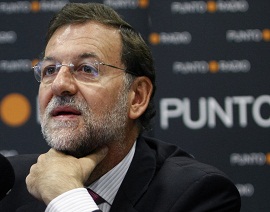 By Julia Pastor, in Madrid | In view of the dangerous increase in the Spanish risk premium, People’s Party (PP) candidate Mariano Rajoy, who all polls point at as the president of the next Spanish government, has sent a message to the markets:
By Julia Pastor, in Madrid | In view of the dangerous increase in the Spanish risk premium, People’s Party (PP) candidate Mariano Rajoy, who all polls point at as the president of the next Spanish government, has sent a message to the markets:
“Hope they realise that we are holding general elections here, and the ones who win are within their right to expect a longer leeway than just half an hour.”
Rajoy’s statements are a reaction to the comments from The Economist , which advises him to act quickly because there is not much time,
“He looks likely to get his wish. But for his sake and Spain’s, he must hope that his reserves of luck extend far beyond election night.”
The British business magazine is not the only international media outlet to echo and warn about the urgent situation of the Spanish economy. FT Deustchland mentions the panic in Spain and its demand for the European Central Bank’s help, while Reuters affirms that no matter how many measures are taken or how fast they are put in practice, they will not save Spain if the euro zone does not find a systemic sustainable solution.
At the other side of the Atlantic, perspectives are little optimistic also. CNBC’s program Mad Money, summarized yesterday night the global perception about the Spanish problem:
“Not since the Spanish Civil War — not since Christopher Columbus, if you want to go back in time — has Spain mattered so much to the global stage — or to us”.
Since weeks, even months, all polls place Rajoy’s Peoples’s Party as winner with an absolute majority. Estimations suggest a PP’s victory with 198 seats in comparison to 112 seats (47,5% of votes vs 29,8%) of Socialist Party (PSOE), its more direct rival, whose candidate Alfredo P. Rubalcaba would reap the bitterest defeat in the history of Spanish democracy.
According to the European Council of Foreign Relations, a prestigious think tank, Rajoy would be preparing a strong austerity reform plan
“Rajoy has a credible plan to ‘shock and awe’ financial markets with austerity measures, budget cuts and structural reforms that sell Spain as a “Germany of the south” and point Spain back on a course of economic growth”
in order to dissociate itself from the other peripheral countries, namely Italy, Greece and Portugal.
This need of reducing public expenses, along with the regulatory changes that the new government’s policies would involve, will affect Spanish businesses. The financial analysts of Ahorro Corporación think that
“banking, pharmaceutical, infrastructure and public services will be the most hit, while media sector will be the most favoured.”





Be the first to comment on "Rajoy’s answer to The Economist: “Give me more than half an hour”"